If you’re serious about growing your business, Google ad management can prove to be an invaluable investment, maximizing your Return on Investment (ROI) and ensuring that every ad is optimized to achieve your goals.
The Google Ads platform is so easy to use that anyone can launch an ad campaign in minutes. However, the difference between those who see significant returns on their ad spend and those left scratching their heads wondering why they didn’t reach their goals is usually that the former know how to use the platform to their advantage.
If you’re in the latter group and aren’t seeing the results you want from your ad campaigns, read on.
In this guide, our Pay Per Click advertising specialists outline why Google ad management is so fundamental to the long-term growth of your company.
Get My Free Google Ads Marketing Plan
Why Your Business Needs Google Ads
Google Ads has been a game changer for modern businesses.
In 2022 alone, the platform generated $224.47 billion in revenue from advertisers who know how to get their brand, products and services in front of the biggest search audience in the world:
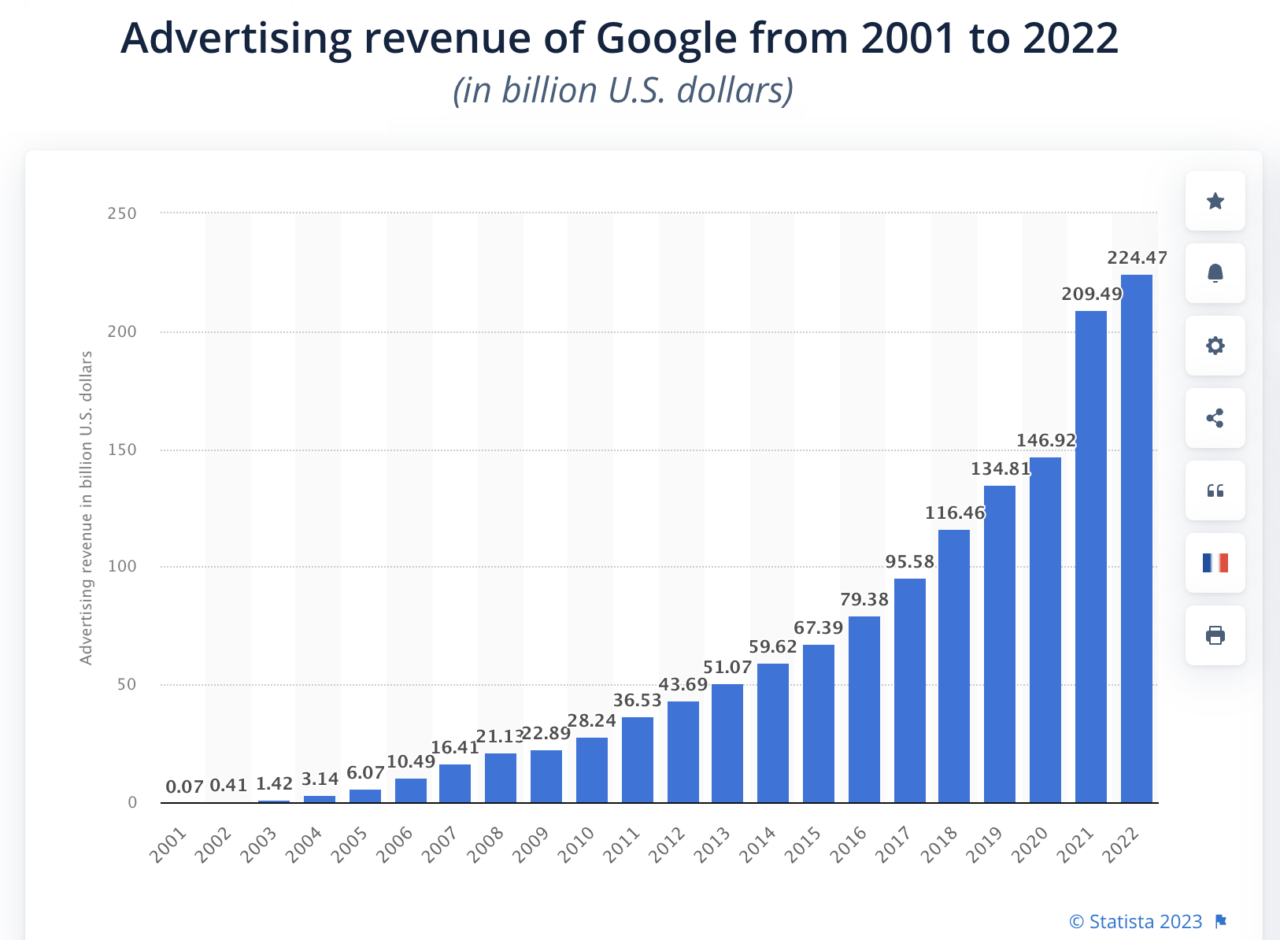
By doing so, Google’s chief economist, Hal Varian, estimates that, as a baseline:
Businesses generate $2 in revenue for every $1 of ad spend – or up to $8-$11 in revenue for each dollar spent.
To put that another way, a $100 investment in PPC advertising on Google could generate as much as $800-$1,100 in revenue.
Whether your company’s ad campaigns come out at the top or bottom end of that scale, it all depends on how those campaigns are managed.
Dive Deeper: How to Lower the Cost of Google Ads and Get Better Conversions
The Benefits of Effective Ad Management
Go it alone, and though you’re likely to reap some rewards from PPC advertising, you’ll find that results may pale compared to those generated by experienced Google Ads management pros who can help you get more bang for your buck.
Hand over the reins to an expert, and you could benefit from:
1) Improved Ad Targeting
If there’s any single reason why Google has become a leader in the online ad industry, it’s their advanced targeting features that allow you to carefully tailor your ads to reach the right people at the right time.
Of course, as a business owner, it’s safe to assume that you understand your audience pretty well (you’ve probably created buyer personas), but knowing exactly how to set up the perfect ad campaign to reach them is a whole different ball game.
Google ads management involves taking a closer look at your audience than you may have ever taken before. It involves going beyond basic demographics and diving deep into their online behavior.
Right from the start, this can help determine which type of ad campaign to start with:
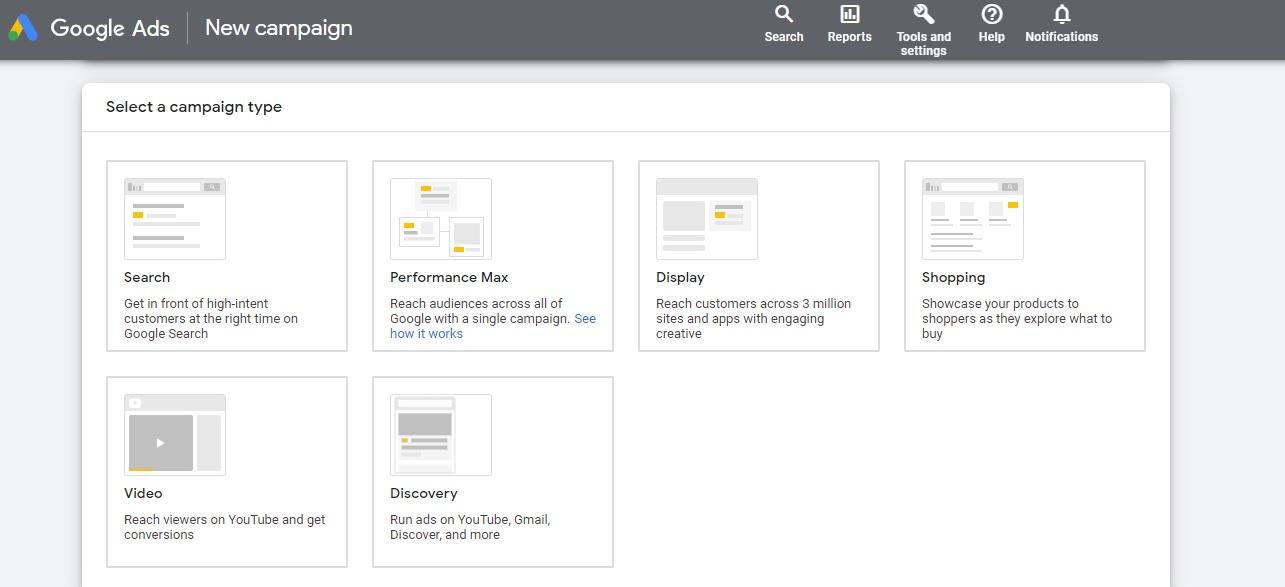
If an audience analysis reveals that your ideal customer is likely to spend a lot of their time online engaging with video content, then either video ads or Discovery ads displayed on YouTube may be suitable. This will ensure that not a penny is wasted on other campaign types on platforms where your audience spends less time.
An ad manager will also be able to draw on the audience insights they gain about your business and improve your targeting by creating custom segments:
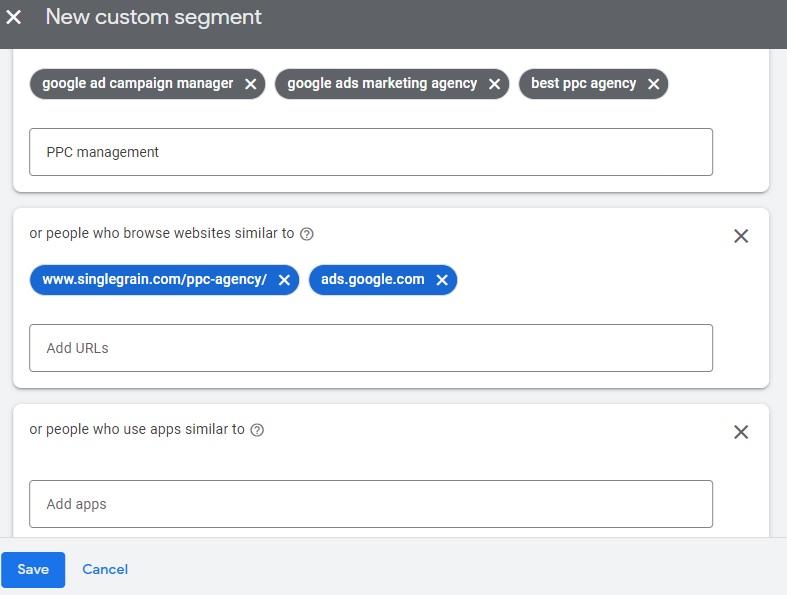
Experienced ad managers can take advantage of a wealth of ad targeting options to develop detailed customer profiles that are fine-tuned to ensure that you’re hitting precisely the right kind of people.
Dive Deeper: The Ultimate Guide to Developing Buyer Personas (with Templates!)
2) Better Budget Management
You can already see how ad targeting can help save your company money to make sure every cent is optimally invested in reaching the right people. Still, the cost-efficiency benefits don’t end there.
Google Ads management specialists can draw on their wealth of experience and historical data to help you set an appropriate budget limit, monitor your ad spend and adjust bids on targeted keywords to get the most value from your advertising spend.
Dive Deeper: How to Determine a Marketing Budget for Your Brand in 2023
3) Effective Keyword Management
Keywords are the rock-solid foundation upon which your entire ad campaign is based, so each one must be carefully chosen for maximum impact.
There’s more to this than a little off-the-top-of-the-head thinking about the search terms and key phrases your customers might search for.
Sure, that’s a good place to start, but only if it’s followed up with thorough keyword research, using industry-standard tools like Ahrefs or Semrush to analyze each potential targeted keyword. These tools can help you answer important questions such as:
- Are enough people searching for this term to justify targeting it?
- How much competition is there for this keyword?
- What’s the average Cost Per Click (CPC) for this keyword?
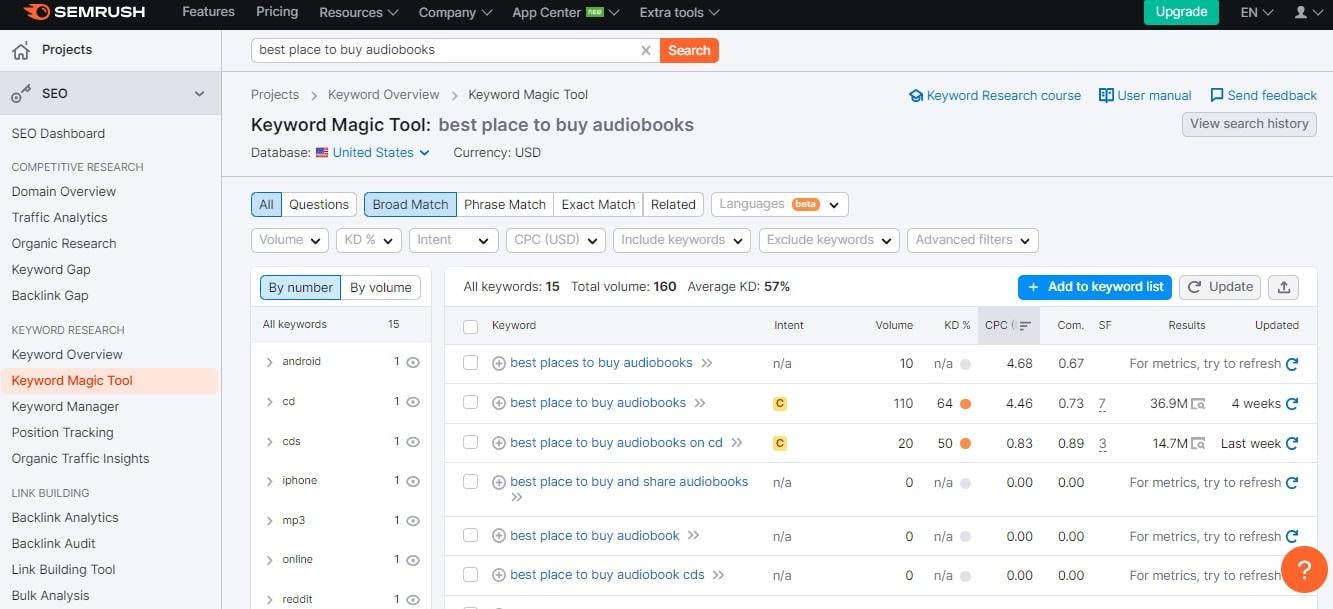
Google Ads management takes the time and hassle out of doing the data analysis necessary to answer these pivotal questions. A pro can quickly and easily pinpoint those keywords that hit the sweet spot of high volume, low competition and value-generating CPC.
Dive Deeper: Targeting Branded vs. SEO Keywords: Which Should You Focus On?
4) Ad Copy Optimization
Keywords may be the foundation of your campaign, but it’s your ad copy that is the real star of the show. Your headline takes center stage and draws people’s attention towards your brand before the rest of your copy seals the deal, compelling those people to go forth and take action.
Now everything we’ve discussed so far all comes together as one:
- It’s impossible to write effective ad copy without knowing who you’re writing it for, which is why truly understanding your audience and what they want is the first vital step of ads management.
- Likewise, you must know the kind of keywords you’ll need to use to ensure that your ad reaches that specific audience.
Maximizing the value from your ad spend is all about taking both of these things and working them naturally into captivating copy that highlights your USP (Unique Selling Point) and ends with an irresistible Call to Action (CTA).
For some businesses, investing in Google Ads management is worth it for this alone, as most agencies will have a skilled wordsmith who combines an in-depth knowledge of how online advertising works with a talent for writing powerful copy that makes a serious impact.
Dive Deeper: How to Create Compelling Text Ads on Google (with Examples)
Get My Free Google Ads Marketing Plan
5) A/B Testing for Better Results
Maximizing your ad spend is an ongoing operation that we’ll refer to as the 3T Process, the three Ts in question being:
- Testing. Google Ads management frequently involves A/B testing, a process of creating two versions of the same ad with one minor difference to see which one performs better. For example, it may be that you run two ads that are identical apart from their headlines or two versions of an ad, each with a different call to action.
- Tweaking. Once the test has run its course, ads management specialists analyze the results, drawing on their findings to tweak and refine a campaign. For example, if one headline consistently generates more click-throughs than another, that’s the one to invest in.
- Trying Again. A/B testing isn’t a one-time-only task. To get the most out of your advertising efforts, it’s important to continue testing new variations, analyzing the results, tweaking the ad, and doing the whole thing over again until you’ve mastered what works for your brand.
Dive Deeper: How to Run A/B Tests that Actually Increase Conversions
6) Real-Time Ad Performance Monitoring and Accurate Reporting
We talk a lot about using Google Ads to grow your business, but, of course, that may mean something completely different from one business owner to the next:
- For some, it’s increasing revenues by getting more product-buying customers to their e-commerce site.
- For others, it’s increasing app downloads or email list signups.
Whatever the case may be for your brand, one of the most critical components of your Google Ads campaign is monitoring and measuring the extent to which your ads achieve that goal.
Real-time monitoring can help gain insights into your target audience, their behavior and how they interact with your ads, providing an opportunity to make meaningful adjustments based on accurate data.
Regular ad performance reporting via tools like the Google Ads dashboard and Google Analytics can make a significant difference to your marketing effort. It helps you identify underperforming ads or keywords, measure your ROI and make informed decisions about what to do next.
Whether you’re a small e-commerce business aiming to sell more products or a growing graphic design agency looking to land those lucrative enterprise contracts, the ultimate goal of any company investing in Google Ads is the same.
Dive Deeper: How to Improve E-Commerce Landing Pages with Paid Ads Data
7) Competitive Advantage
So far, we’ve written this guide as if your enterprise exists in its own little bubble where all you have to do is let people know you exist and convince them to buy what you’re selling.
Alas, it’s not quite so simple.
It’s unlikely that you’re the only business in your industry deploying Google Ads, and the more crowded your space is, the more companies there are competing to get eyeballs on their ads.
This is where hiring a professional to manage your Google Ads can prove worth its weight in gold. Ad management specialists can draw on their wealth of experience and expertise, combine it with the latest industry-standard ad management technology and utilize it to secure a substantial competitive advantage for your company.
Ever searched Google for a specific product and found that the top display ads are all for that product’s most significant competitors?
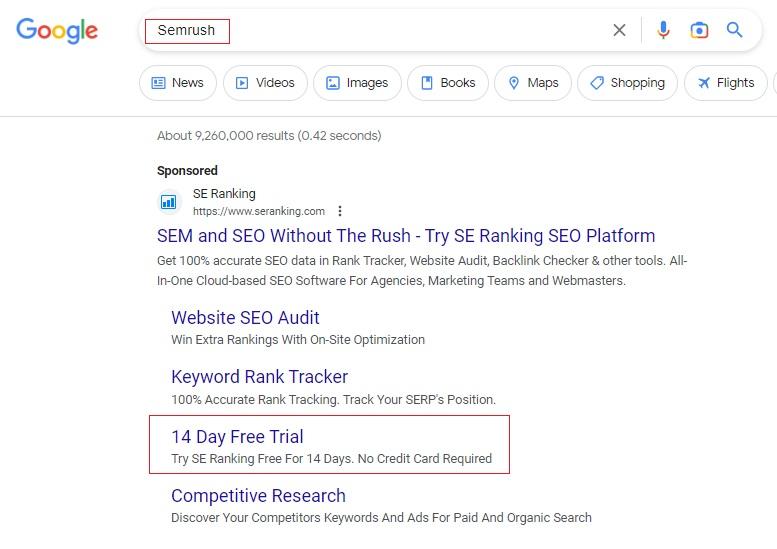
That’s not an accident.
Those rival companies have all used the same strategies and techniques used by top Google Ads agencies to get their brand seen by people searching for a competing product.
A good Google Ads management agency will take the time to understand your business and develop customized strategies that are tailored to your specific needs and goals. This can help you stay ahead of your competition by targeting the right audience with the right message.
Dive Deeper: 20 Paid & Free SEO Tools That Will Improve Your Ranking
8) Generate the Best ROI Possible
If you’ve been paying attention so far, you’ll notice that every single aspect of Google advertising management ultimately contributes to this one primary objective: Generate the highest ROI you can.
To ensure this, you must follow a specific to-do list:
- Set clear goals to determine what you want to achieve with your campaign.
- Perform audience and keyword research accurately describe your products or services and gets your message to the people most likely to respond to it.
- Create compelling copy that increases the likelihood that they will respond to it.
- Optimize your landing pages so that they’re relevant to your ad copy and provide a clear CTA.
- Use A/B testing and analyzing to continually strengthen every ad so you know which ones to double down on and which to stop running.
- Monitor your campaign performance regularly and make adjustments as needed.
Dive Deeper:
* 9 Google Ads Trends You Can’t Ignore in 2023
* Best Google Ads Agency: Top 5 Choices for 2023
* Best AdWords Management Agency: Top 5 Picks for 2023
Why Google Ad Management Is Essential for Maximizing Your Ad Spend: Your Key Takeaway
If you’ve learned anything from reading this guide, we hope it’s that there’s much more to running successful ad campaigns than firing up Google Ads, throwing up an ad and hoping for the best.
Maximizing your Google Ad spend is as much about research and analysis as it is about the ads themselves. This involves identifying your target audience, understanding their online behavior, pinpointing the perfect keywords and running regular A/B tests,
All this takes time, effort and expertise, which is why so many businesses rely on ads management agencies to do the hard work for them so they can focus on more mission-critical matters.
Ready to see how Google Ad management can help your business earn more revenue and achieve your key priorities? Click the orange button below to request your free consultation! 👇






